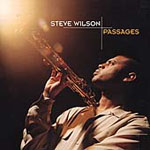Home » Jazz Articles » Album Review » Spock's Beard: V
Spock's Beard: V
This release can really be divided into two sections: the long songs and the short songs. I'll start with the long ones which bookmark the CD. V kicks off in typical Beard fashion with a 16 minute piece titled "At the End of the Day," which comes complete with a mix of horns, Latin-inspired guitar playing, a few heavy-metal riffs, and a very Transatlantic-sounding chorus. This piece flows a little better than many of Beard's other long pieces, but its 6-note motif doesn't quite pack the emotional punch that I think Morse intended. "At the End of the Day" isn't a bad song by any means, it's just a little disappointing after having heard some of Morse's compositional work with Transatlantic. Morse has often been accused with forcing length on his songs, stretching what could have been solid 6 or 7 minute songs in to 20 minute pieces just for the sake of it. This couldn't be more the case than on V 's closer, a 28-minute doozy (actually, more like "dozer") titled "The Great Nothing". This song kicks off with Okumoto's ominous mellotron - Genesis' "Watcher of the Skies" immediately came to mind. Unfortunately, the entrancing opening is followed up by a very uninteresting instrumental passage; as a matter of fact the problem with this track as a whole is that it suffers from uninteresting instrumental breaks. Some of the vocal parts of the song work very well, but whenever the instrumental noodling begins the song quickly loses its focus. If Morse could've cut this song in half Beard could've had an excellent extended piece, but there just aren't 28 minutes of good ideas in "The Great Nothing".
Oddly enough, it is in between the behemoths where we find Spock's Beard being most effective. Morse has an excellent ear for catchy hooks, and he flaunts this ability on songs such as "All on a Sunday" and "Goodbye to Yesterday". "Sunday" is a very effective pop song tailor-made for alternative radio (although I'm sure it won't make any station's playlist), sounding a little bit like Matthew Sweet or The Rembrandts. "Goodbye to Yesterday" is a "hold your lighter high" ballad that features some very nice acoustic guitar and vocals from Morse and some excellent arranging as well. The only weak spot in the CDs middle section is "Revelation," which is basically a riff-based rocker without a decent riff.
Where Beard really shines is on the pseudo-sequel, "Thoughts (Part II)," which I think is supposed to be a follow-up to "Thoughts" from the Beware of Darkness CD. Reason I'm not so sure is because musically, "Part II" has nothing at all to do with the original except for the bizarre vocal harmonies that hearken back to its predecessor. The track has a real extended feel to it, but surprisingly when you look at the CD cover you realize the song clocks in at under 5 minutes. In this limited amount of space, the boys manage to throw in the aforementioned vocal breaks, some great acoustic guitar work, killer bass licks from Dave Meros, and a string section(!) - all to great effect. As a matter of fact, despite it's short length "Thoughts (Part II)" is the most progressive-sounding track on V, proving that size isn't everything in prog.
All in all, I think fans of Beard will be pleased with V as long as they're not expecting anything earth-shattering out of Morse and Co. Some fans may object to some of Morse's dabbling in pop music, but it would be unfair to dismiss V simply due to these tracks - they are actually the strength of the album. Although it may be "prog heresy" to say this, I look forward to the day when Spock's Beard releases a CD where all the tracks come in at under 10 minutes - I think Morse's songwriting talents lie more in this range, and it will avoid the "forced" feeling of some of his longer compositions.
Track Listing
1. At the End of the Day (16:30), 2. Revelation (6:04), 3. Thoughts (Part II) (4:41), 4. All on a Sunday (4:12), 5. Goodbye to Yesterday (4:40), 6. The Great Nothing (27:18)
Personnel
Neal Morse: Lead Vocals, Piano, All Synths, Acoustic Guitar; Ryo Okumoto: Hammond Organ, Mellotron; Dave Meros: Bass, Stand-up Bass, Vocals, French Horn; Nick D'Virgilio: Drums, Percussion, Vocals; Alan Morse: Electric Guitar, Vocals, Cello, and Sampler
Album information
Title: V | Year Released: 2000 | Record Label: Metal Blade
Tags
PREVIOUS / NEXT
Support All About Jazz
 All About Jazz has been a pillar of jazz since 1995, championing it as an art form and, more importantly, supporting the musicians who make it. Our enduring commitment has made "AAJ" one of the most culturally important websites of its kind, read by hundreds of thousands of fans, musicians and industry figures every month.
All About Jazz has been a pillar of jazz since 1995, championing it as an art form and, more importantly, supporting the musicians who make it. Our enduring commitment has made "AAJ" one of the most culturally important websites of its kind, read by hundreds of thousands of fans, musicians and industry figures every month.


















